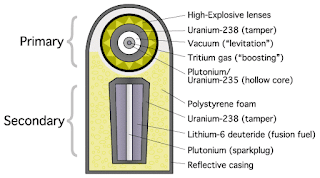| Image Source: Hiroshima Peace Media |
Topics: Existentialism, Nuclear Physics, Nuclear Power
The fear of entrusting "the nuclear codes" has always been casually thrown about without much understanding of the stakes.
There's a cartoon understanding of the power of nuclear weapons, even on science-friendly shows like Star Trek. The 22nd, 23rd and 24th Centuries are pristine, clean and pollution free. Human lifespan extended by almost one-hundred years, and the Third World War was fought in their fictional timeline of the 21st Century with a remarkable lack of radiation, fallout or uninhabitable areas of the globe.
We of course, in the real world, entered the nuclear age in World War II with the Enola Gay dropping the first of its kind weapons on Hiroshima and Nagasaki. The war ended with this savagery, and we were briefly the dominate and only nuclear power.
That of course changed rapidly. Our previous wartime allies - then the Soviet Union - developed their own weapons, which ushered in what became known as The Cold War and along with it spy statecraft. Popular franchises like Ian Fleming's James Bond 007 movies, The Man From U.N.C.L.E. and the original Jason Bourne novels by Robert Ludlum capitalized on our collective cultural angst with Armageddon.
The creation of nuclear weapons is likely one of physics, and by extension science's most regrettable sins. It is often pointed to as example of its usage for evil; fuel for the disdain of acquiring knowledge, encouraging inquiry, trusting facts and reality. Dr. J. Robert Oppenheimer put this regret in words, poignantly quoting the Bhagavad Gita:
What Dr. Oppenheimer described was an atomic weapon only, not to dismiss the destructiveness of "Little Boy" and "Fat Man." To further escalate the possibility of a human extinction-level event self-imposed, the Teller-Ulam design increased the megaton yield to unimaginable, dystopian levels.
 |
| Image Source: Thermonuclear Weapon on Wikipedia |
Excerpts from The Atomic Archive:
All present nuclear weapon designs require the splitting of heavy elements like uranium and plutonium. The energy released in this fission process is many millions of times greater, pound for pound, than the most energetic chemical reactions. The smaller nuclear weapon, in the low-kiloton range, may rely solely on the energy released by the fission process, as did the first bombs which devastated Hiroshima and Nagasaki in 1945.
The larger yield nuclear weapons derive a substantial part of their explosive force from the fusion of heavy forms of hydrogen--deuterium and tritium. Since there is virtually no limitation on the volume of fusion materials in a weapon, and the materials are less costly than fissionable materials, the fusion, "thermonuclear," or "hydrogen" bomb brought a radical increase in the explosive power of weapons. However, the fission process is still necessary to achieve the high temperatures and pressures needed to trigger the hydrogen fusion reactions. Thus, all nuclear detonations produce radioactive fragments of heavy elements fission, with the larger bursts producing an additional radiation component from the fusion process.
The nuclear fragments of heavy-element fission which are of greatest concern are those radioactive atoms (also called radionuclides) which decay by emitting energetic electrons or gamma particles. (See "Radioactivity" note.) An important characteristic here is the rate of decay. This is measured in terms of "half-life"--the time required for one-half of the original substance to decay--which ranges from days to thousands of years for the bomb-produced radionuclides of principal interest. (See "Nuclear Half-Life" note.) Another factor which is critical in determining the hazard of radionuclides is the chemistry of the atoms. This determines whether they will be taken up by the body through respiration or the food cycle and incorporated into tissue. If this occurs, the risk of biological damage from the destructive ionizing radiation (see "Radioactivity" note) is multiplied.
Probably the most serious threat is cesium-137, a gamma emitter with a half-life of 30 years. It is a major source of radiation in nuclear fallout, and since it parallels potassium chemistry, it is readily taken into the blood of animals and men and may be incorporated into tissue. Other hazards are strontium-90, an electron emitter with a half-life of 28 years, and iodine-131 with a half-life of only 8 days. Strontium-90 follows calcium chemistry, so that it is readily incorporated into the bones and teeth, particularly of young children who have received milk from cows consuming contaminated forage. Iodine-131 is a similar threat to infants and children because of its concentration in the thyroid gland. In addition, there is plutonium-239, frequently used in nuclear explosives. A bone-seeker like strontium-90, it may also become lodged in the lungs, where its intense local radiation can cause cancer or other damage.
Plutonium-239 decays through emission of an alpha particle (helium nucleus) and has a half-life of 24,000 years. To the extent that hydrogen fusion contributes to the explosive force of a weapon, two other radionuclides will be released: tritium (hydrogen-3), an electron emitter with a half-life of 12 years, and carbon-14, an electron emitter with a half-life of 5,730 years. Both are taken up through the food cycle and readily incorporated in organic matter.
It is sobering any presidential candidate would openly speculate using nuclear weapons as a FIRST option. The knife edge philosophy of M.A.D.: Mutually Assured Destruction requires sober minds that will use diplomacy first and not salivate for the unthinkable, goaded by a mean-girl tweet. It is breathtaking "conscientious stupidity"*; a modern-day know-nothingness, an arrogant pride in ignorance: it is cartoon physics.
Half-life for the continuation of the human species...is no life at all.
* "Nothing in the world more dangerous than sincere ignorance and conscientious stupidity." Dr. Martin Luther King, Jr.
Atomic Archive: Worldwide Effects of Nuclear War - Radioactive Fallout
Comments